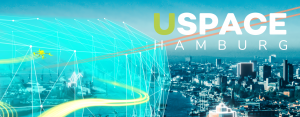Droniq GmbH and its parent company DFS, the German air navigation service provider, are setting up a U-Space Sandbox in the Port of Hamburg, Germany’s largest seaport by volume. The project has a volume of approximately one million euro and is being funded partly by the German Federal Ministry of Transport and Digital Infrastructure (BMVI).
“By doing so, the BMVI is setting the foundations for the implementation of further U-Spaces in Germany and promoting the further development of the local drone market,” says a company press release.
“In the future, U-Space will also allow the full potential of drones to be exploited in urban areas within an established framework,” says Droniq CEO Jan-Eric Putze. “For unmanned aerial transport, this is a milestone. We are proud to show for the first time what this future can look like.”
Drone traffic in U-Space is coordinated by a U-Space Service Provider (USSP), a task taken on by Droniq as part of the Real Laboratory. It issues permits for drone missions and informs pilots about the current manned and unmanned air traffic as well as any airspace restrictions.

The second central role is fulfilled by DFS. As the Single Common Information Service Provider (SCISP), it supplies Droniq with all relevant airspace and air traffic data for the provision of U-Space services. Furthermore, with the manned aviation data, all air traffic, manned and unmanned, can be displayed in a combined air situation picture. This is an essential prerequisite for flights beyond the visual range of pilots – and thus for the efficient use of drones.
“In the fourth quarter, Droniq and DFS will demonstrate how a U-Space can function during the Flight Weeks. Prior to this, the conception, development and internal testing of the U-Space Sandbox will take place. The implementation of the U-Space Sandbox is being carried out with several project partners. These include the Hamburg Port Authority (HPA), HHLA Sky GmbH, the Hamburg Ministry of Economics and Innovation, Hamburg Aviation and the project consortium UDVeo.”
Hamburg’s Senator for Economics and Innovation Michael Westhagemann: “The Port of Hamburg offers the best environment to test a traffic system for drones and evaluate the opportunities and challenges. Used wisely, drones offer enormous potential in a host of areas of business and society. As I see it, the U-Space Real Laboratory means we can test the potential offered by a new kind of air transport under real conditions and actively shape its development. That is why I am delighted about the decision of the Federal Ministry of Transport to support the project in Hamburg.”
Federal Minister Andreas Scheuer: “The future of drones in Germany will be innovative, intelligent and interlinked. We are about to launch Germany’s first drone airspace test bed in Hamburg, laying the groundwork for the transport system of tomorrow. In the U-space real-world laboratory, we will be putting drones to the test in practical application to find smart ways to safely integrate drones and, in the future air taxis, into our airspace. Drones are a clean, fast and smart mobility solution, especially in the logistics sector, for supporting emergency services or delivering supplies to rural areas. The U-space real-world laboratory will enable us to grow German-engineered drone innovations from their niche market and help them take to the skies.”
For more information
www.u-space-hamburg.de 3/4 Press Release_U-Space Sandbox Hamburg
(Image: Exemplary representation of the U-Space Sandbox: The U-Space Sandbox will be built in in the Port of Hamburg. The exact location as well as the dimensions of it will be determined during the conception. In U-Space, special rules and procedures coordinate drone traffic. Drone flights can be carried out quickly, safely and without a long approval process – even beyond the pilot’s line of sight. Image rights: Fabiano Waewell / EyeEm via Getty Images)



